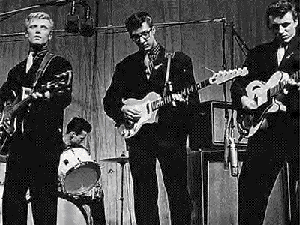WHY THE SHADOWS MATTERED
Thu. June 17, 2004Categories: Abstract Dynamics
Or, how Hank Marvin led to Lee Perry (Attention, Paul Meme)

Chris Cutler, File Under Popular: Theoretical and Critical Writings on Music:
‘The Shadows exemplified and perfected a form which was to have a far more profound effect on British Rock Music than the song form – this was the Instrumental. …
In the Instrumental, … it was, crucially, less the melody than the sound that mattered most. Each tune could have its own ‘voice’, using stopped or damped strings, echo, the termolo arm, tone filters, different pick-ups, different plectra, electric techniques for making quiet sounds very loud, and so on. For a long time the Instrumental was the field of discovery, and of most amateur group work; the instruments after all had to ‘speak for themselves’ – and their voices had to be discovered. It had the excitement of a Terra Nova.
Instrumental groups sprouted out of every classroom. The instruments were still easy, the form much more exciting and uncharted than Skiffle, and it was fun. And everybody complained about the noise you made rehearsing and horrible and cacophonous the music was – and if you were lucky you could get to play a wedding or a youth club or a hospital dance.
I have dwelt on this because it seems to me that it laid the foundation of so much to come that was uniquely British. After all, it was the beginning, it was where amongst young people in Britain, there emerged a generation of musicians of a new type. And it has always been glossed by pop historians and ‘experts’ as a mere tribituary. The internal dynamic was different. In Britain, it was here, in the Instrumental that the hegemony of the electric guitar was established as the voice of Rock music, here that many of the new forms appropriate to electric instruments were mapped, and here that the music was carried deep into non-black and non-American styles by excited, untrained, autodidact teenagers.’
cutler’s general tone always gets up my nose and he’s shakier on pop history than he thinks he is but on this specific point he’s right i think: there were US precursors but the whole point wz that the UK (as a whole) was quite isolated from US pop at exactly the moment it (ie the UK bedroom underground which “became” the 60s) was in such ferment
GUITAR historians (and guitarists) *always* give marvin his due… but it’s true that they are a despised breed
You’re going to use the words “texture not timbre” next — I can feel it. Or, maybe, “instruMENTALIST” — the Shadows as hidden forebears of the ‘ardkore continuum.
Maybe there’s something about the Shadows being avatars of evolution — from Light Entertainment to Prog?
You’ve made a good point about excited Brit teens taking the black r’n’b ball and running with it (itself an interesing variation on the Clapton / Burdon / Jagger etc thesis) but…. hmmm… maybe you’re going a bit far saying Britain “defined” the sound of rock geetars. Reckon the definition was done by Bo Diddley, Muddy Waters, Carl Perkins, Link Wray perhaps? Probably Joe Meek’s a better candidate over here anyway.
Oh, and you haven’t demonstrated the Lee Perry connection in anything other than general terms but I’d let that pass if I were you :-). Go the light entertainment / easy listening route — more scope there, and it sits better with the Potter obsession.
Good post, and I think it’s instructive to compare with what happened in Africa with the introduction of the electric guitar in the early 70s. It was the tone that mattered, and the best groups had the best sounding guitars, and the emphasis was generally on a clean tone. Even if there was a chorus, it was still pretty clean sounding. It inclined the groups towards long instrumental passages, with long sustain and fluid notes (“listen to the sustain on that! Listen, don’t touch!” they’re almost saying). Those guys played with such a light touch you can hardly heard the fingering, just the tone. A similar sort of guitar worship to the Shadows.
meaning to check em out for YEARS…perhaps this will finally be the impetus i need, to hear what you lot are going on about for myself
Trunk Funk?
the reverb unit used in King Tubby’s studio was a customized Fisher reverb. In the 1960sThe Fisher Corp. sold a tube driven reverb called Fisher K-10 “Spacexpander”. It seems these were quite popular at the time in radio studios but also for car radios (“.. spring reverb from the 60s often found in the trunk of 57 Chevys hooked up to the car radio. It made a great sound when you drove over railroad tracks.”)
…from the dub scrolls